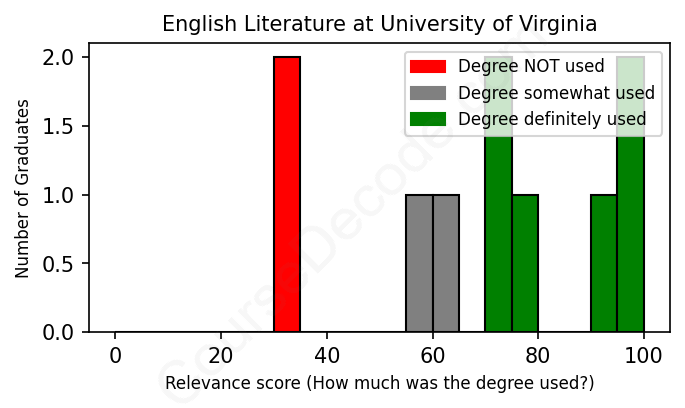
First, some facts. Of the English Literature graduates from University of Virginia we've analyzed , here's how many have used (or NOT used) their degree in their career:

These are estimates based on AI analysis of 10 LinkedIn profiles (see below).
The verdict? Slightly above average. Overall, with an average relevance score of 69%, English Literature graduates from University of Virginia have a slightly higher likelihood (+2%) of finding work in this field compared to the average graduate across all fields:
And for comparison, here's the chart for all profiles we've looked at across all degrees.
Also, after graduating, 40% of these graduates have pursued further education other than another Bachelor's degree (such as a Masters degree or other), compared to the average across all profiles of 35%. This suggests you may need more than just a Bachelors degree to be competitive as a English Literature graduate.
See the details:
|
Relevance score: 72% We think this person has gone into a career highly relevant to their degree. We think this person has gone into a career highly relevant to their degree.
DEGREE INFOGraduated in 2013 from University of Virginia with a Bachelor of Arts (B.A.) in English Literature. No other secondary education since. JOB HISTORY SINCE GRADUATIONExecutive Assistant To Chief Executive Officer C12 Capital Management Oct 2014 - May 2017 Office Manager  C12 Capital Management Mar 2015 - May 2017 Executive Assistant to Chairman and Database Coordinator, Global Business Policy Council  Kearney Oct 2017 - Dec 2018 Executive Assistant to Chairman and Senior Database Coordinator, Global Business Policy Council  Kearney Jan 2019 - Jan 2020 Senior Database Coordinator & Strategic Accounts Specialist, Global Business Policy Council  Kearney Jan 2020 - Dec 2022 Events & Marketing Specialist  Kearney Jan 2023 - Dec 2023 Events and Marketing Manager  Kearney Jan 2024 - Present ABOUTNo information provided. |
The top 10 most common jobs done by the graduates we've analyzed (ranked most common to least) are:
When looking at the career paths of people who studied English Literature at the University of Virginia, a few common job types stand out. A lot of graduates find roles in education, like teaching English or acting as tutors. These positions typically leverage the analytical and writing skills they've developed during their studies, making them quite relevant to their degree. For example, many graduates became teachers or tutors, which involves a lot of reading, writing, and discussion about literary texts—everything that English Lit majors really thrive on. On the other hand, some have pursued creative roles in writing, editing, or even acting, where understanding literature adds value to their work.
However, not all jobs held by these graduates are directly linked to English Literature. There are several instances where individuals took on roles in administration, marketing, or customer service—positions that, while they might require some communication skills, don't really tap into the core competencies of literary analysis or creative writing learned in their studies. So while there are definitely a good number of relevant positions, it’s clear that many graduates have ventured into fields where their degree isn't the main focus. Overall, the connection to English Literature varies widely depending on individual career choices, showing that English majors can adapt their skills to a broad range of professions, even if not all are directly related to literature.
Here is a visual representation of the most common words in job titles for English Literature graduates (this is across all English Literature graduates we've analyzed, not just those who went to University of Virginia):

When looking at the career trajectories of graduates from the University of Virginia with degrees in English Literature, it’s clear that people initially gravitate towards roles that leverage their writing and communication skills. Most graduates seem to start off in positions that are either directly related to education, like teaching roles or tutoring, or in creative fields like writing, editing, and theater. This makes sense, considering the critical thinking and analytical skills honed through an English Literature degree. However, there's also a noticeable shift over time, as some individuals move away from purely literary careers into broader roles in administration, marketing, and various non-profit sectors.
As time progresses, many graduates find themselves taking on managerial or coordinator roles, which may not be directly linked to their English Literature background but still utilize their critical thinking and communication abilities. A significant portion of these alumni also transitions into consistent roles in education, where they can apply their knowledge and skills. Others branch out into corporate environments, showcasing a diverse career path that includes education coordinators, marketing specialists, and executive assistants. So, while it’s promising that many get good jobs related to writing and teaching initially, there’s a fair mix of those who veer into more traditional corporate roles over the years. Overall, the trajectory seems quite flexible, showing both creativity and practicality among these graduates in navigating their career paths.
Hey! So, a Bachelor’s degree in English Literature, like the one at the University of Virginia, tends to be on the challenging side, but it really depends on your passion for reading and writing. You’ll be diving into a lot of complex texts, analyzing themes, and writing essays that require not just comprehension but also critical thinking and a strong command of language. If you enjoy literature and have a knack for expressing your thoughts clearly, you might find it more manageable. However, if writing and deep analysis aren’t your thing, it could feel a bit tougher compared to other degrees. Overall, it’s not the easiest path, but if you're into stories and literature, it can be super rewarding!
Most commonly, in the LinkedIn profiles we've looked at, it takes people 4 years to finish a Bachelor degree in English Literature.
Looking at the job paths of these English Literature grads from the University of Virginia, it seems like they've had a mixed bag when it comes to making decent money. Some of them, especially those who moved into teaching or non-profit roles, might be on the lower end of the salary spectrum, particularly in the earlier part of their careers. For example, substitute teaching and volunteer roles don’t usually pay much. Others, like the grad who worked their way up in a capital management firm, likely saw better pay as they progressed. Overall, while some have landed reasonably well-paying jobs, it seems like many are still hustling in areas that don’t pay as handsomely, especially in the arts and education sectors, at least early on.
Here is a visual representation of the most common words seen in the "about" section of LinkedIn profiles who have a Bachelor degree in English Literature (this is across all English Literature graduates we've analyzed, not just those who went to University of Virginia). This may or may not be useful:

Here are all colleges offering a Bachelor degree in English Literature (ordered by the average relevance score of their English Literature graduates, best to worst) where we have analyzed at least 10 of their graduates: